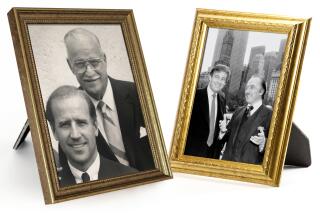Bush Dodges Missteps His Father Made
- Share via
George Herbert Walker Bush won the war and lost the peace. His son, President George W. Bush, appears determined to avoid the same mistake--if he possibly can. That will probably be a much greater challenge than it looks today, even as the bombs begin falling in Afghanistan.
The younger Bush has good reason to fear the precedent. During the Persian Gulf War in 1991, the elder Bush’s job approval rate soared to about 90%--the same stratospheric level the son is inhabiting now.
But as soon as the troops came home from Iraq, a weak economy relentlessly undermined the father’s public support. Eventually, in 1992, he was routed in his bid for reelection; only three incumbent presidents in American history saw their share of the vote decline as much over four years as Bush did.
The elder Bush suffered a particularly precipitous collapse. But it’s been surprisingly common for the support that rallies around a president in a foreign crisis to melt away in peacetime.
Republican pollster Bill McInturff recently studied 11 previous foreign crises--from the attack on Pearl Harbor to the onset of the Korean War to Iran’s seizure of American hostages.
In each case, the sitting president saw his approval rating soar. But in each instance, the president’s support had fallen back to where it started within a year; in most cases, the president lost all of his new support within six months. “The historic precedent is that by August of next year, Bush would be about back to where he was before all of this started,” McInturff says.
New circumstances could change that pattern. Bush received a bigger boost in his approval rating--from about 50% to 55% before the Sept. 11 attacks to as much as 90% after--than any of his predecessors, even before he launched Sunday’s military action. That gives him a bigger cushion against future erosion.
The amorphous, open-ended nature of the conflict against terrorism could extend the rally-effect for a longer time. And Bush’s resolute but measured performance in the crisis could produce an irreversible political benefit by permanently reducing the number of Americans who doubt he’s really up to the job.
Yet, for all that, Bush can’t afford to lose sight of trouble at home as he deploys his response in Afghanistan. The political danger for Bush is real--and growing. Voters judge presidents above all on the state of the nation, and the economy always looms large in that judgment. All signs suggest the U.S. is heading for a winter of economic discontent.
With a weakened economy battered further by the attacks, top White House advisors have privately warned supporters that unemployment could spike well past 6% next year. If unemployment does hit those heights, and the terrorist crisis recedes, it’s possible that one year from now Bush’s approval rating could fall back to about 50%--the point at which the warning lights in any White House go off.
Bush is confronting that risk much more aggressively than his father did. The difference reveals a larger dynamic. Throughout his political career, the younger Bush has taken some lessons from his father’s successes--like the priority he’s placed on assembling an international coalition during the current crisis.
But Bush has always seemed to be more influenced by his father’s failures. And that’s vividly apparent in the contrast between their responses to the complex challenge of managing a war abroad and a faltering economy at home.
The elder Bush put all his energy into the Gulf War and slighted the economy long after it began sinking in summer 1990. In his 1991 State of the Union address, just after the bombing began in Iraq, Bush offered a minimalist economic recovery plan centered on a cut in capital gains taxes. Over the course of 1991, unemployment rose from 6.4% to 7.3%--but Bush twice blocked congressional efforts to provide extended unemployment benefits for those out of work.
“We think we are coming out of recession, and now is not the time to be piling on a big spending program,” Bush’s press secretary declared after a temporary dip in unemployment that July. Only after a revolt by congressional Republicans did Bush that November finally sign a bill extending unemployment aid.
Bush didn’t issue a full-scale recovery plan until his January 1992 State of the Union address--and even then only after devoting the speech’s first 47 paragraphs to foreign policy. By then his approval rating had dropped below the telltale 50% mark--where it remained through his rejection that November.
This Bush isn’t waiting to get caught in such an undertow. Concern for the unemployed has been almost as much a part of his public message since Sept. 11 as threats for the terrorists. After some initial hesitance, he’s moved quickly to design an economic stimulus plan with Congress.
The father proposed a capital gains tax cut and resisted extended unemployment benefits. The son has resisted a capital gains tax cut and last week proposed to extend unemployment benefits for 13 weeks. “Maybe he just learned from his old man,” said one admiring senior Democratic strategist.
Even without a capital gains tax cut, Democrats will still argue that the economic stimulus plan Bush is assembling still leans too much toward tax cuts for business.
And they consider Bush’s unemployment plan too limited: It would provide the extended benefits only in New York, Pennsylvania and Virginia (the states most directly affected by the attack) and in other states where unemployment jumps 30% or more after Sept. 11.
But those differences don’t compare to the bright line Bush’s father provided Democrats by advancing an economic plan so easily portrayed as more concerned about investors than workers.
Besides proposing more unemployment aid, this Bush has also signaled he’ll accept a Democratic plan to provide rebates for working-poor taxpayers who didn’t benefit from the last rebate because they don’t pay income taxes. Tax cuts for people who don’t pay income taxes is ordinarily anathema to Republicans.
All of this suggests Bush has learned real lessons from his father’s experiences. The more difficult question is whether that will be enough to avoid his father’s fate. Even while focusing on war, Bush is doing all he can to fortify himself against an economic downturn.
But history suggests there are no real defenses for a president when the wave of economic discontent grows high enough. Which means that when it comes to his reelection--and more immediately the GOP prospects in 2002--Bush is now in a two-front war.
He’s extended the long arm of American military force half the world away into Afghanistan. But, politically, the stakes at home are as high as the stakes abroad--maybe even higher.
*
Ronald Brownstein’s column appears every Monday. See current and past Brownstein columns on The Times’ Web site at: https://www.latimes.com/brownstein.
More to Read
Get the L.A. Times Politics newsletter
Deeply reported insights into legislation, politics and policy from Sacramento, Washington and beyond. In your inbox twice per week.
You may occasionally receive promotional content from the Los Angeles Times.










